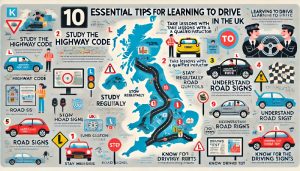 10 Essential Tips for Learning to Drive in the UK
10 Essential Tips for Learning to Drive in the UK
Learning to drive is an exciting milestone, but it can also feel daunting, especially with the UK’s busy roads and strict driving tests. Whether you’re just starting out or looking to refine your skills, these 10 essential tips will help you build confidence and prepare you for safe, independent driving.
1. Apply for Your Provisional Licence Early
Before you can take lessons, you’ll need a provisional driving licence. Apply online through the DVLA as soon as you turn 15 years and 9 months (though you can only start driving a car at 17). Having it ready means no delays in booking lessons.
2. Choose the Right Driving Instructor
A good instructor and driving lessions, makes all the difference. Look for someone who is DVSA-approved (ADI), has positive reviews, and teaches in a way that suits your learning style. Don’t be afraid to try a few instructors before settling on the right one.
3. Book Lessons Consistently
Consistency is key. Aim for regular lessons (at least 1–2 per week) so you retain what you learn. Long gaps can make you feel like you’re starting over each time.
4. Practise Outside of Lessons
If you have access to a car and a supervising driver (21+ with at least 3 years’ experience), make the most of private practice. It’s a great way to build confidence, especially on quieter roads or car parks.
5. Learn the Highway Code
Passing your theory test and being a safe driver both depend on knowing the Highway Code. Set aside time to study road signs, speed limits, and rules for different road users.
6. Get Familiar with Test Routes
While your instructor can’t guarantee you’ll get a certain route, practising on common local test routes will help you get used to tricky junctions, roundabouts, and roads near your chosen test centre.
7. Don’t Rush the Process
Everyone learns at their own pace. The DVSA recommends around 45 hours of lessons plus 22 hours of practice before taking the test. Focus on becoming a safe driver, not just on passing quickly.
8. Practise Driving in Different Conditions
UK weather can be unpredictable. Try to practise in rain, fog, or at night (with your instructor’s guidance) so you’re prepared for real-world conditions.
9. Stay Calm Under Pressure
Mistakes happen while learning. Instead of panicking, practise staying calm and correcting yourself. This resilience will help during your test if nerves kick in.
10. Book Your Test When You’re Ready
It’s tempting to book your test early, but doing so before you’re confident can lead to unnecessary stress and failure. Trust your instructor’s advice on when you’re ready to give it your best shot.
